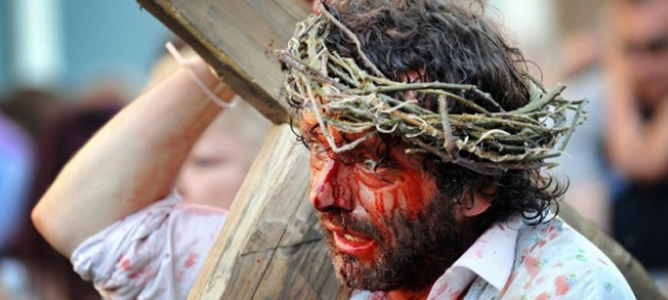When a traditionally religious town in South Wales opts to stage a secularised Passion play for their Easter celebrations, is it a case of modernisation for accessibility or an augury for a moribund ideology? This question is part of what makes Dave McKean’s imperfect but extraordinarily brave film, Gospel of Us, so fascinating.
Michael Sheen stars as The Teacher in this adaptation of a story which probably doesn’t need to be explained. The film itself, however, is much harder to define. Part documentary, part film in its own right, Gospel of Us is essentially a record of the play created by Owen Sheers and Sheen, performed over Easter weekend 2011.
Gospel of Us is a very confused piece. Apart from the obvious obstacles faced when filming a play, The Passion of Port Talbot created further issues by being set all over the town, running for 72 hours, and being entirely at the mercy of its audience (all Port Talbot). This makes the film at times unashamedly ramshackle, while at others it tries to hide the fact, making it disorientating. It also melds apocrypha with standard gospel, apparently for no other reason than it can, while the Barabbas as would-be terrorist idea is so underdeveloped it sticks out as a vacuity.
Though the film resolves little, it illuminates a lot. The amount of people watching via camera-phone is pretty damning of our ability to perceive only through media, while 20,000 people watching an excruciatingly realistic crucifixion is an undeniably powerful image. Yet what is perhaps most striking is that all of The Teacher’s disciples are from the fringes of society. Given that Sheen’s character himself only becomes The Teacher after a psychological breakdown, there is a definite Jungian “every man needs his own myth” streak to this story. Play, film, documentary, secular, religious, beautiful, messy; Gospel of Us could be described as many things, but it is nothing if not admirable. Just don’t hold your breath for the sequel.


Comments